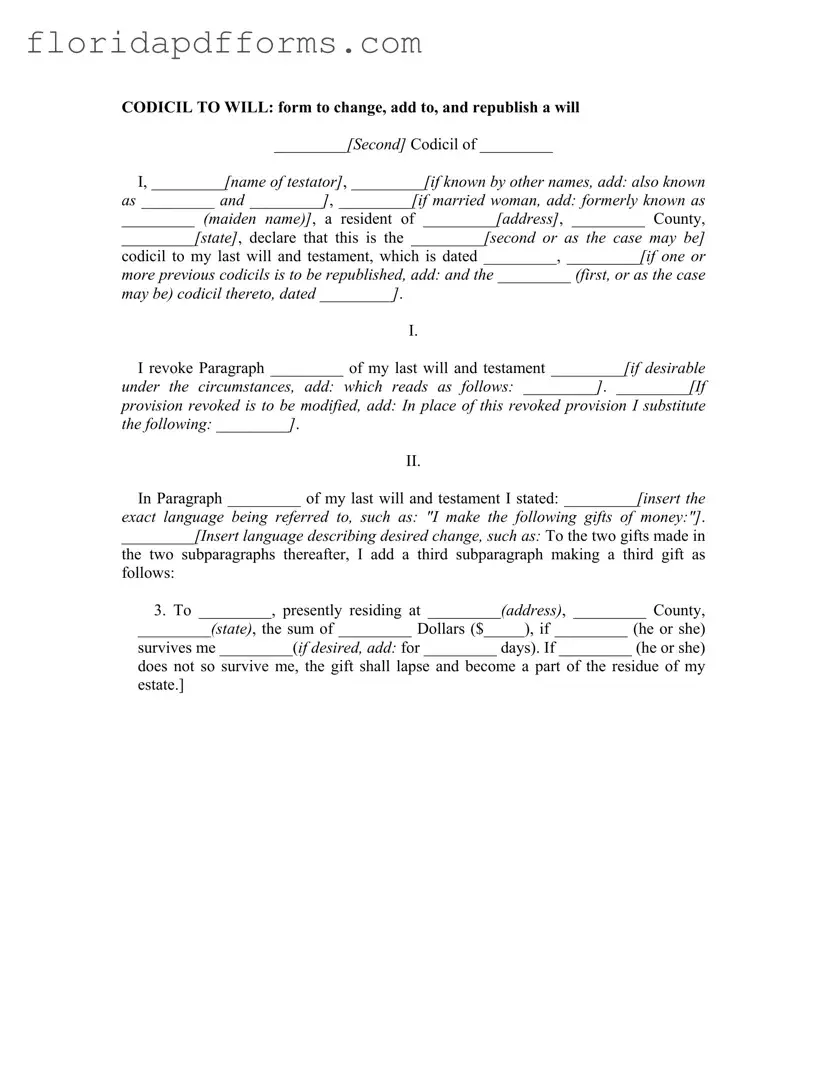CODICIL TO WILL: form to change, add to, and republish a will
_________[Second] Codicil of _________
I, _________[name of testator], _________[if known by other names, add: also known
as _________ and _________], _________[if married woman, add: formerly known as
_________ (maiden name)], a resident of _________[address], _________ County,
_________[state], declare that this is the _________[second or as the case may be]
codicil to my last will and testament, which is dated _________, _________[if one or
more previous codicils is to be republished, add: and the _________ (first, or as the case
may be) codicil thereto, dated _________].
I.
I revoke Paragraph _________ of my last will and testament _________[if desirable
under the circumstances, add: which reads as follows: _________]. _________[If
provision revoked is to be modified, add: In place of this revoked provision I substitute
the following: _________].
II.
In Paragraph _________ of my last will and testament I stated: _________[insert the
exact language being referred to, such as: "I make the following gifts of money:"].
_________[Insert language describing desired change, such as: To the two gifts made in
the two subparagraphs thereafter, I add a third subparagraph making a third gift as follows:
3.To _________, presently residing at _________(address), _________ County,
_________(state), the sum of _________ Dollars ($_____), if _________ (he or she) survives me _________(if desired, add: for _________ days). If _________ (he or she) does not so survive me, the gift shall lapse and become a part of the residue of my estate.]
III.
I hereby confirm and republish my will dated _________, _________[if previous
codicil is to be republished, add: and my codicil to that will dated _________] in all
respects other than those above-mentioned.
I subscribe my name to this codicil on _________[date], at _________[address],
_________ County, _________[state], in the presence of _________, _________, and
_________, attesting witnesses, who subscribe their names to this codicil on
_________[date] at my request and in my presence.
[Signature]
ATTESTATION CLAUSE
On the date last above written, _________[testator's name], known to us to be the
person whose signature ap-pears at the end of this codicil, declared to us, the undersigned, that the foregoing instrument, consisting of _________pages, including the
page on which we have signed as witnesses, was the _________[number, such as:
second] codicil to _________[his or her] will dated _________. _________[He or She]
then signed the codicil in our presence and, at _________[his or her] request, in
_________[his or her] presence and in the presence of each other, we now sign our
names as witnesses. |
|
|
_________, |
residing at |
_________ |
[Signature] |
|
[Street, city, state] |
_________, |
residing at |
_________ |
[Signature] |
|
[Street, city, state] |
_________, |
residing at |
_________ |
[Signature] |
|
[Street, city, state] |

